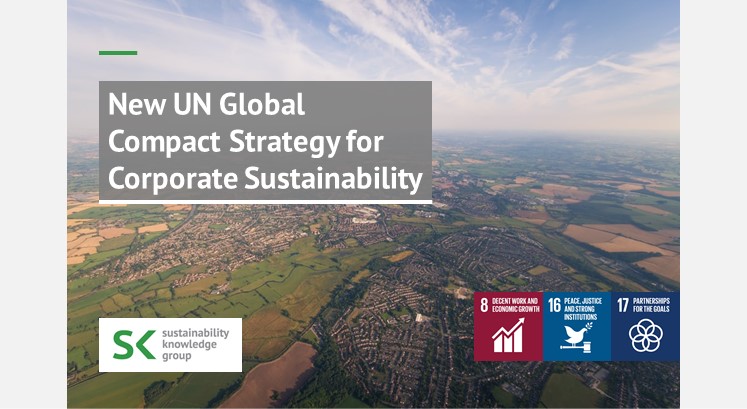The UN Global Compact Council adopted a new three-year strategy (UN Global Compact Strategy 2021-2023) to broaden business ambition. The plan calls for companies to increase their contributions and work towards achieving the Sustainable Development Goals (SDGs), the Paris Agreement on Climate Change and the Ten Principles of the UN Global Compact.
The UN Global Compact Initiative is the world’s largest corporate sustainability initiative. Participants in the UN Global Compact include more than 12,000 businesses and 3,000 non-business stakeholders across 160 countries. The Global Compact uses specific measurable goals to mobilise participating companies fast. It will prioritize action and measurable impact on five of the SDGs:
- SDG 5 (Gender Equality)
- SDG 8 (Decent Work and Economic Growth)
- SDG 13 (Climate Action)
- SDG 16 (Peace, Justice and Strong Institutions)
- SDG 17 (Partnership for the Goals)
The new strategy
“Our goal is to raise expectations of how businesses will embed all Ten Principles. These are intrinsic to a company and serve as the enabler for contributions towards achieving the 2030 Agenda for Sustainable Development and the Paris Agreement. The five key shifts articulated in this strategy reflect our ambitions for global growth, prioritization and impact at scale” Sanda Ojiambo said.
The new strategy aims to achieve five key shifts to enable meaningful new strides in the current global, environmental, and social context:
- Accountable companies: The UN Global Compact will strive to move companies participating in it faster and farther than other companies (which are not part of the UN Global Compact) in demonstrating progress in corporate sustainability and responsible business practices.
- Balanced growth of local and regional networks for global coverage: The UN Global Compact Local Networks will be expanded to bring about change and build more dynamic national ecosystems for business sustainability. In addition to the existing 69 local networks, new national and regional networks for the Global Compact will be launched, focusing on the Global South, China and the United States.
- Measurable impact in priority areas: The UN Global Compact programmes focus on the Ten Principles of leadership and prioritize the five issue areas that the Global Compact seeks to lead and shape: Gender Equality (SDG 5), Decent Work and Economic Growth (SDG 8), Climate Action (SDG 13), Peace Justice and Strong Institutions (SDG 16) and Partnerships (SDG 17) while adapting to each country’s unique context.
- Harnessing the collective action of SMEs: SMEs play an important role in promoting corporate sustainability and responsible business practices individually and in the value chains in which they participate. Since more than half of the Global Compact participants come from this segment, the UN Global Compact will establish targeted and cross-cutting SMEs programmes that leverage digital tools and value chains to reach scale.
- Strong and active engagement with the UN and its partners: The strategy calls for deeper cooperation at the global and national levels with UN agencies and UN country teams to promote corporate sustainability and responsible business practices globally.
As part of following up on these five strategic shifts, the UN Global Compact will measure global collective impact of business in five critical areas:
- The number of Global Compact participants committed to the goals of the Paris Agreement
- Making public commitments to human rights and labour, demonstrating broad-based gender parity in operations
- Enforcing compliance on anti-corruption and bribery
- Taking actions to advance the SDGs
CoP as A Learning Tool
The Global Compact is also revising its reporting framework to help companies better align sustainability reporting with the global sustainable development agenda through the Communication on Progress (CoP) Framework. The value of CoP will be enhanced by reorienting it as an educational tool and making data searchable by sector and geography, as participants are required to submit an annual report using (CoP).
As a result, the revised framework will:
- Provide governments with concrete and reliable data on the private sector’s contribution to the SDGs, to be reflected in their Voluntary National Reviews (VNRs)
- Help UN organizations identify partners in the business community
- Coordinate comparable data to enable businesses to track their progress over time, compare their performance with their peers, and demonstrate progress towards the Ten Principles and the SDGs
“Together, we will be One Global Compact uniting business for a better world”
So far, the world is still not on the right track to achieve the 2030 Agenda and the SDGs. There is an urgent need for the business community to raise its ambition and advance responsible business practices. The UN Global Compact seeks through the new strategy to motivate companies to change the way they operate and how they affect the environment to contribute to achieving SDGs and the Paris Agreement’s goals.
___
Sustainability Knowledge Group is a global Sustainability, ESG and CSR advisory firm dedicated in creating value through strategic advisory and training solutions, coaching and meetups. We work with organisations to develop, manage, and measure effective Sustainability strategies and programs, address social and environmental challenges, and bring tangible results, positive impact and create better businesses.
As a CPD Standards and ILM Recognised Provider, Sustainability Knowledge Group offers certified training courses on Sustainability. To join our trainings and gain the skills and knowledge you need to lead in Sustainability, visit: https://sustainabilityknowledgegroup.com/training
Book now for our next certified training: Sustainable Development Goals (SDGs) for Business, on 29/03/2021 – 30/03/2021
Photo by William Hook on Unsplash

